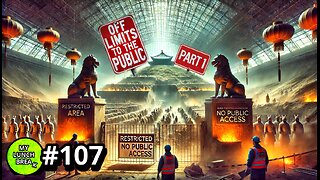Premium Only Content

Episode 1512: City of God - St. Augustine - Book 6 - Immortality of the soul
Matthew 7:7
"Ask and it will be given to you; seek and you will find; knock and the door will be opened to you."
This is a statement made by Jesus during the Sermon on the Mount, where he is teaching his disciples about prayer and trusting in God's provision. But also for us to seek those things of God and not man. Seek spiritual knowledge. Further your discipline and let go of this world. The more you do that the higher you will sore and that’s what all the sainst discovered.
Book 6: Augustine examines the philosophy of Plato and discusses the immortality of the soul.
In Book 6 of Augustine's "City of God," Augustine delves into the topic of the immortality of the soul. Here's an overview of the main themes and arguments in Book 6:
Introduction to Immortality:
Augustine begins Book 6 by emphasizing the importance of understanding the nature of the soul and its immortality. He asserts that this knowledge is crucial for contemplating the eternal destiny of individuals.
Augustine introduces the topic of the immortality of the soul. Here are more details about the introduction to the immortality of the soul:
Significance of the Soul:
Augustine begins by emphasizing the profound significance of understanding the nature of the soul and its immortality. He considers this knowledge to be essential for contemplating the eternal destiny of individuals and for living a life aligned with spiritual truths.
Creation by God:
Augustine asserts that the soul is a creation of God and is distinct from the physical body. He posits that the soul possesses faculties such as reason, intellect, and the capacity for contemplation, which set it apart from the material world.
Immaterial and Indestructible:
Augustine emphasizes that the soul is immaterial and not subject to physical decay or destruction. Unlike the body, which is mortal and perishable, the soul possesses an intrinsic quality of immortality.
Plato's Influence:
Augustine acknowledges the influence of the philosopher Plato on the concept of the immortality of the soul. He discusses Plato's ideas, particularly those presented in the dialogue "Phaedo," where Plato argues for the soul's pre-existence and its continued existence after death.
Christian Perspective on the Soul:
Augustine presents the Christian viewpoint on the soul, aligning it with the belief in its immortality. He contends that the soul's destiny after death is contingent on its relationship with God, emphasizing the importance of faith, righteousness, and divine grace.
The Soul's Quest for Truth:
Augustine highlights the soul's innate desire to seek truth and ultimate meaning. He posits that this yearning is a reflection of the soul's immaterial nature and its innate orientation toward the eternal.
Relation to the City of God:
Augustine establishes a connection between the immortality of the soul and the overarching themes of the two cities—the earthly city and the City of God. The immortality of the soul becomes a crucial element in considering the ultimate destinies of individuals within these two realms.
Moral Implications:
Augustine suggests that an understanding of the immortality of the soul has profound moral implications. It encourages individuals to consider the eternal consequences of their actions and choices, guiding them toward a life lived in accordance with divine principles.
In the introduction to the immortality of the soul, Augustine lays the foundation for his subsequent exploration of this profound theological and philosophical concept. He sets the stage for a deeper examination of the soul's destiny, the nature of human existence, and the contrasting values of the earthly city and the City of God.
The Soul's Origin:
Augustine argues that the soul is created by God and is distinct from the physical body. He asserts that the soul is endowed with reason and intellect, allowing it to contemplate and seek truth.
Here are more details about Augustine's discussion on the soul's origin:
Divine Creation:
Augustine asserts that the soul is a direct creation of God. He argues that the soul is not a product of biological processes or material substances but is a special and unique creation by the Divine. This view aligns with the Christian belief that all life, including the human soul, is a gift from God.
Distinct from the Body:
Augustine emphasizes the distinction between the soul and the physical body. While the body is subject to the laws of the material world and is mortal, the soul is immaterial and possesses characteristics that transcend the physical realm. It is the seat of consciousness, intellect, and moral agency.
Intellect and Reason:
Augustine attributes faculties like intellect and reason to the soul. He believes that these intellectual capacities set the soul apart from the physical world and enable it to engage in higher-order thinking, contemplation, and the pursuit of truth.
Immortality:
Augustine reiterates the belief in the immortality of the soul. He contends that the soul's immaterial nature makes it impervious to the decay and dissolution that affect the physical body. This immortality is seen as a reflection of the soul's divine origin.
Pre-existent Souls:
Augustine does not endorse the idea of pre-existent souls, which suggests that souls exist prior to their embodiment in a physical form. He maintains that each soul is created by God at the moment of conception, as part of His divine plan.
Imprint of the Divine Image:
Augustine suggests that the creation of the soul is a reflection of God's image and likeness. The soul bears a unique imprint of the Divine, endowing it with the capacity for moral agency, rational thought, and spiritual awareness.
Purpose of the Soul:
Augustine proposes that the soul's purpose is to seek truth and to ultimately find its fulfillment and happiness in God. Through intellectual contemplation and moral choices, the soul's journey leads it toward God, who is the ultimate source of goodness and truth.
Relation to the Eternal:
Augustine emphasizes that the soul's origin ties it to the eternal and transcendent reality of God. The soul's existence is not confined to the temporal realm, but is part of a larger cosmic and spiritual order.
By delving into the origin of the soul, Augustine lays the groundwork for a deeper exploration of the soul's destiny, its relationship with God, and its role in the broader context of the City of God. His discussion of the soul's origin addresses fundamental questions about human existence, identity, and purpose.
Plato's Influence:
Augustine acknowledges the influence of the philosopher Plato on the concept of the immortality of the soul. He discusses Plato's ideas, particularly in the "Phaedo," regarding the eternal nature of the soul and its pre-existence before entering the physical body.
Augustine acknowledges the significant influence of the philosopher Plato, particularly in Plato's dialogues, on the concept of the immortality of the soul. Here are more details about Plato's influence as discussed by Augustine:
Phaedo and the Immortality of the Soul:
Augustine specifically references Plato's dialogue "Phaedo" as a primary source of Platonic thought on the immortality of the soul. In this dialogue, Socrates presents arguments for the soul's pre-existence and eternal nature.
Theory of Recollection:
One of the key ideas from the "Phaedo" that Augustine alludes to is the Theory of Recollection. According to this theory, the soul possesses innate knowledge and understanding that it recollects from previous existences before being embodied in a physical form.
Pre-Existence and Immortality:
Plato's philosophy, as presented in the "Phaedo," suggests that the soul exists prior to its incarnation in a physical body and continues to exist after death. This aligns with the notion of the soul's immortality and its eternal nature.
Dualism of Body and Soul:
Plato's dualism, which distinguishes between the perishable, material body and the immortal, immaterial soul, is reflected in Augustine's discussion of the soul's origin. Augustine, like Plato, emphasizes the distinction between the physical body and the immortal soul.
Innate Knowledge and Truth:
Plato's belief in innate knowledge, which the soul possesses prior to its embodiment, resonates with Augustine's understanding of the soul's capacity for intellectual pursuits and the pursuit of truth. Both thinkers emphasize the soul's innate inclination toward the eternal and the transcendent.
Seeking the Forms:
Plato's philosophy posits the existence of Forms or Ideas that represent the ultimate reality and truth. Augustine, influenced by this idea, argues that the soul's journey involves seeking and contemplating these eternal truths, ultimately leading it toward God.
Resonance with Christian Thought:
Augustine acknowledges that certain aspects of Plato's philosophy, particularly those related to the immortality of the soul, are compatible with Christian beliefs. He sees in Plato's ideas a natural affinity with the Christian concept of the soul's eternal destiny.
Integration with Christian Doctrine:
Augustine integrates elements of Platonic thought into his Christian theology, particularly in his discussions on the nature of the soul and its relationship with God. He seeks to harmonize these philosophical ideas with Christian doctrine.
By referencing Plato's philosophy, Augustine enriches his theological exploration of the soul's immortality. He engages with classical philosophical thought while integrating it into his Christian worldview, contributing to a deeper understanding of the nature and destiny of the soul.
Christian Perspective on Immortality:
Augustine presents the Christian view of the soul's immortality. He maintains that the soul is immortal and that its destiny after death depends on whether it is united with God through faith and righteousness.
Augustine presents the Christian perspective on the immortality of the soul. Here are more details about the Christian viewpoint on immortality as discussed by Augustine:
Divine Creation:
Augustine affirms the Christian belief that the soul is a creation of God. He emphasizes that God, as the ultimate Creator, bestows the gift of life, including the immortal soul, upon individuals.
Distinction from Materialism:
Augustine contrasts the Christian perspective with materialistic views that consider the soul to be a byproduct of physical processes. Instead, he asserts that the soul is distinct from the material body and has its own spiritual and eternal nature.
Eternal Destiny:
Augustine maintains that the soul's destiny after death is a fundamental aspect of Christian faith. He teaches that the soul's ultimate destination depends on its relationship with God and its adherence to Christian principles of faith, righteousness, and divine grace.
Redemption and Resurrection:
Augustine incorporates key Christian doctrines into his discussion. He emphasizes the Christian hope of redemption through Christ's sacrifice and the promise of bodily resurrection. This resurrection entails the reunification of the soul with a glorified body.
Faith and Righteousness:
Augustine underscores the importance of faith and righteousness in determining the soul's eternal destiny. He teaches that faith in God's promises, along with a life lived in accordance with moral and ethical principles, are integral to the Christian perspective on immortality.
Moral Accountability:
Augustine aligns the Christian perspective with the idea of moral accountability. He argues that individuals are responsible for their actions and will face divine judgment based on their choices. This judgment determines their eternal fate.
Communion with God:
Augustine emphasizes that the ultimate fulfillment of the soul lies in communion with God. He teaches that the soul's immortality allows for an everlasting union with the Divine, where individuals experience the fullness of love, truth, and eternal happiness.
The Role of Grace:
Augustine emphasizes the role of divine grace in the Christian perspective on immortality. He teaches that it is through God's unmerited favor and assistance that individuals are able to attain salvation and experience the fullness of eternal life.
Contrast with Earthly Pursuits:
Augustine warns against becoming overly attached to temporal pursuits and earthly desires. He encourages individuals to prioritize their relationship with God and to seek the eternal good, which leads to true fulfillment and immortality in the City of God.
By presenting the Christian perspective on immortality, Augustine addresses fundamental questions about the nature of human existence, the significance of faith, and the ultimate hope that Christians hold for eternal life in communion with God. His theological insights contribute to a deeper understanding of Christian beliefs regarding the destiny of the soul.
The Soul's Journey:
Augustine likens the soul's journey through life to a pilgrimage, where it undergoes various experiences and moral choices. He emphasizes that the soul's ultimate destination depends on its orientation towards God.
Augustine discusses the concept of the soul's journey. Here are more details about Augustine's exploration of the soul's journey:
Pilgrimage and Sojourning:
Augustine likens the soul's experience in the temporal world to a pilgrimage or sojourn. He suggests that the soul is on a journey through life, traversing various experiences, challenges, and moral choices.
Temporal Life as a Testing Ground:
Augustine posits that earthly life serves as a testing ground for the soul. It is a period of moral decision-making, where individuals are faced with opportunities to align themselves with either the values of the earthly city or the City of God.
Moral Choices and Free Will:
Augustine emphasizes the role of free will in the soul's journey. He teaches that individuals have the capacity to make moral choices, determining the direction of their journey. These choices have consequences and impact the soul's ultimate destiny.
Orientation Toward God:
Augustine asserts that the soul's journey is fundamentally oriented toward God. The soul is drawn to seek and contemplate truth, goodness, and the ultimate source of all being. This orientation reflects the soul's innate longing for union with the Divine.
Seeking Eternal Truths:
Augustine suggests that the soul's journey involves seeking eternal truths. Through intellectual contemplation and moral discernment, the soul strives to align itself with the eternal and transcendent realities that lead to God.
Conflict and Tension:
Augustine acknowledges that the soul's journey is marked by conflict and tension. The earthly city, with its temporal values and desires, often opposes the soul's quest for eternal truths. This tension reflects the larger spiritual struggle between good and evil.
The Role of Grace and Divine Guidance:
Augustine emphasizes the role of divine grace in guiding the soul's journey. He teaches that God provides assistance and illumination to those who seek Him. Divine grace enables individuals to make virtuous choices and navigate the challenges of the earthly pilgrimage.
Temporal Suffering and Eternal Reward:
Augustine addresses the relationship between temporal suffering and eternal reward. He contends that even if the righteous face adversity and persecution in the earthly city, they can find comfort in the promise of eternal reward in the City of God.
Transformation and Sanctification:
Augustine introduces the idea of the soul's transformation through the process of sanctification. As the soul progresses on its journey, it is gradually conformed to the image of Christ through the work of the Holy Spirit.
By exploring the concept of the soul's journey, Augustine provides a framework for understanding the moral and spiritual dimensions of human existence. The soul's journey becomes a central theme in his larger exploration of the contrasting destinies and values of the two cities—the earthly city and the City of God. It underscores the significance of free will, moral agency, and the pursuit of eternal truths in the human quest for fulfillment and union with God.
Eternal Happiness and Misery:
Augustine asserts that the soul's ultimate goal is either eternal happiness with God in the City of God or eternal misery separated from God. This destiny is determined by the soul's love and devotion to God.
Augustine delves into the concept of eternal happiness and misery. Here are more details about Augustine's exploration of eternal happiness and misery:
Ultimate Destiny:
Augustine contends that every human being has an ultimate destiny that extends beyond the temporal realm. This destiny is determined by the soul's orientation toward God and its adherence to divine principles.
Eternal Happiness:
Augustine defines eternal happiness as the highest and most fulfilling state of being. It is characterized by perfect and unending union with God, the source of all goodness, truth, and love. Eternal happiness is the ultimate goal of the soul's journey.
Union with God:
Augustine emphasizes that eternal happiness is achieved through complete and unbroken union with God. In this state, the soul experiences the fullness of God's presence and love, leading to an incomparable and boundless joy.
Transcendence of Earthly Desires:
Augustine teaches that eternal happiness transcends the temporal desires and pleasures of the earthly city. It goes beyond the pursuit of material wealth, physical pleasure, and worldly success, offering a higher, lasting fulfillment.
Moral Accountability and Judgment:
Augustine underscores that individuals are morally accountable for their actions and choices. Divine judgment determines whether the soul attains eternal happiness or experiences a state of eternal misery. This judgment is based on the soul's adherence to righteousness and faith.
Eternal Misery:
Augustine contrasts eternal happiness with the state of eternal misery. This is the condition of those who, due to their rejection of God or their pursuit of earthly desires at the expense of spiritual values, experience separation from God and the absence of true fulfillment.
The Nature of Misery:
Augustine explains that eternal misery is characterized by a profound sense of loss, emptiness, and despair. It is a state of spiritual destitution and separation from the source of all goodness, resulting in an enduring anguish of the soul.
Temporal Suffering and Eternal Reward:
Augustine addresses the relationship between temporal suffering and eternal reward. He argues that even if the righteous face adversity and persecution in the earthly city, they can find comfort in the promise of eternal happiness in the City of God.
Hope and Encouragement:
Augustine's discussion of eternal happiness serves as a source of hope and encouragement for believers. It provides assurance that the trials and tribulations of earthly life are temporary, and that ultimate fulfillment awaits those who remain faithful to God.
Eschatological Fulfillment:
Augustine's teachings on eternal happiness contribute to the larger eschatological framework of Christian theology. They address the ultimate fulfillment of human existence in the context of God's divine plan for creation.
By exploring the concepts of eternal happiness and misery, Augustine addresses fundamental questions about the nature of human existence and the significance of moral choices. He provides a theological framework for understanding the ultimate destinies of individuals within the two cities—the earthly city and the City of God.
Judgment and Accountability:
Augustine discusses the concept of divine judgment, where God assesses each individual's actions and intentions. He emphasizes that individuals are morally accountable for their choices and will face the consequences in the afterlife.
Augustine discusses the concepts of divine judgment and moral accountability. Here are more details about his exploration of judgment and accountability:
Divine Judgment:
Augustine asserts that divine judgment is a fundamental aspect of Christian belief. It refers to the assessment and evaluation of human actions and intentions by God. This judgment is based on divine justice and determines the eternal destiny of individuals.
Moral Accountability:
Augustine teaches that individuals are morally accountable for their actions. This means that human beings have the capacity to make moral choices, and they are responsible for the consequences of those choices. This accountability is a reflection of the free will given to humanity by God.
The Standard of Judgment:
Augustine explains that the standard by which individuals are judged is based on their adherence to divine principles and their alignment with God's will. Those who live in accordance with righteousness and faith are considered righteous in the eyes of God.
Judgment According to Works:
Augustine emphasizes that individuals are judged not only based on their beliefs or professions of faith, but also according to their actions and deeds. This underscores the importance of living out one's faith through virtuous conduct.
Fairness and Equity:
Augustine contends that God's judgment is characterized by perfect fairness and equity. God judges each individual according to their own unique circumstances, experiences, and capacities. This ensures that the judgment is just and impartial.
Temporal Suffering and Eternal Reward:
Augustine acknowledges that the righteous may face adversity and suffering in the earthly city. However, he assures that these temporal challenges do not negate the promise of eternal reward for those who remain faithful to God.
Contrast with Earthly Justice:
Augustine distinguishes divine judgment from human concepts of justice. While earthly justice is imperfect and may be subject to corruption or error, divine judgment is characterized by absolute righteousness and infallibility.
Mercy and Grace in Judgment:
Augustine acknowledges that God's judgment is tempered with mercy and grace. He believes that God, in His infinite love, offers the opportunity for repentance and forgiveness, even to those who have strayed from the path of righteousness.
Eschatological Hope:
Augustine's teachings on judgment and accountability contribute to the broader eschatological framework of Christian theology. They address the ultimate fulfillment of human existence in the context of God's divine plan for creation.
By exploring the concepts of judgment and accountability, Augustine provides a theological framework for understanding the consequences of human actions and the ultimate destiny of individuals. It underscores the importance of living a life aligned with divine principles and the significance of moral choices in determining one's eternal state.
Temporal Suffering and Eternal Reward:
Augustine addresses the issue of temporal suffering and injustice in the earthly city. He argues that even if the righteous face adversity in this world, they can find comfort in the promise of eternal reward in the City of God.
Augustine addresses the relationship between temporal suffering and eternal reward. Here are more details about his exploration of this theme:
Temporal Suffering:
Augustine acknowledges that the righteous may experience adversity, suffering, and persecution in the earthly city. He observes that the world is filled with various forms of pain, including physical, emotional, and spiritual suffering.
The Problem of Evil:
Augustine grapples with the theological challenge known as the problem of evil. He addresses the apparent discrepancy between the existence of suffering in the world and the belief in an all-powerful and benevolent God. Augustine's perspective suggests that temporal suffering is a consequence of the fallen and imperfect state of the world.
Spiritual Growth and Maturity:
Augustine proposes that temporal suffering can serve as a means of spiritual growth and maturation. He contends that adversity can prompt individuals to turn to God in prayer, seek solace in faith, and cultivate virtues such as patience, endurance, and compassion.
Testing of Faith and Devotion:
Augustine suggests that temporal suffering can be a test of an individual's faith and devotion to God. He believes that facing trials and tribulations can reveal the depth of one's commitment to living a life in accordance with divine principles.
Eternal Reward:
Augustine assures that temporal suffering should not overshadow the promise of eternal reward. He emphasizes that the righteous, who endure suffering with faith and righteousness, will ultimately receive a reward in the City of God. This reward consists of unending union with God, perfect happiness, and the fullness of love.
Contrast with Earthly Values:
Augustine highlights the distinction between the values of the earthly city and the City of God. While the earthly city may prioritize material wealth, power, and transient pleasures, the City of God offers a higher, enduring fulfillment that transcends temporal concerns.
Perseverance and Hope:
Augustine encourages believers to persevere in their faith, even in the face of temporal suffering. He provides a message of hope, assuring them that their endurance will be rewarded with eternal happiness in the presence of God.
Redemptive Perspective:
Augustine's teachings on temporal suffering and eternal reward contribute to his broader understanding of redemption. He sees suffering as part of the human experience, but believes that it can ultimately lead individuals to a deeper union with God and participation in His redemptive plan.
Integration of Suffering into God's Plan:
Augustine emphasizes the providential role of God in allowing suffering. He suggests that God's plan encompasses the ultimate good, even in the midst of temporal challenges, and that suffering can ultimately serve a higher purpose in the divine order.
By addressing the relationship between temporal suffering and eternal reward, Augustine offers a theological perspective on how believers can navigate the challenges of earthly life with the hope of a greater and everlasting fulfillment in the City of God. His teachings provide comfort and encouragement for those facing adversity.
The Hope of Resurrection:
Augustine introduces the Christian hope of bodily resurrection, where the souls of the righteous will be reunited with glorified bodies. He emphasizes that this transformation is a testament to God's ultimate victory over death.
Augustine introduces and elaborates on the Christian hope of bodily resurrection. Here are more details about his exploration of the hope of resurrection:
Physical Resurrection:
Augustine teaches that the Christian hope of resurrection is not a mere spiritual or symbolic event, but a bodily resurrection. He affirms the belief that at the end of time, the dead will be raised with glorified bodies, reuniting their souls with a transformed physical form.
Victory Over Death:
Augustine views resurrection as a triumph over the finality of death. He believes that the resurrection of the dead is a testament to God's power and sovereignty over life and death.
Redemption of the Body:
Augustine emphasizes that the resurrection is an essential part of the redemption of the entire human being, including the physical body. He asserts that the body, which may have experienced suffering and decay, will be restored and transformed in the resurrection.
Harmonization of Faith and Reason:
Augustine addresses questions about the rationality of believing in bodily resurrection. He contends that faith in the resurrection is not contrary to reason, as it aligns with the omnipotence and benevolence of God.
Relation to Christ's Resurrection:
Augustine draws a connection between the hope of resurrection for believers and the resurrection of Christ. He teaches that Christ's victory over death through His own resurrection serves as a guarantee and model for the future resurrection of the faithful.
The Role of Faith:
Augustine acknowledges that belief in the resurrection is a matter of faith. He teaches that the Christian's hope of resurrection is rooted in trust and confidence in God's promises, even when it surpasses human comprehension.
Transformation and Glorification:
Augustine suggests that in the resurrection, the bodies of the faithful will be transformed and glorified. He envisions a state where the redeemed will possess incorruptible, immortal bodies, free from the limitations and imperfections of earthly existence.
Participation in the City of God:
Augustine sees the hope of resurrection as an integral part of the Christian's participation in the City of God. The resurrected believers will experience the fullness of communion with God and fellow citizens in the eternal kingdom.
Consolation for Suffering and Persecution:
Augustine teaches that the hope of resurrection provides comfort and consolation to believers who may face suffering, persecution, or even martyrdom. It assures them that their sacrifices for the faith will ultimately lead to an eternal reward.
By discussing the hope of resurrection, Augustine provides a theological framework for understanding the ultimate destiny of the faithful. This hope serves as a source of comfort, encouragement, and assurance for believers, affirming the promise of eternal life in the City of God.
The Folly of Earthly Attachments:
Augustine warns against becoming overly attached to worldly pursuits and temporal goods. He advises that individuals should focus on cultivating a love for God and seeking the eternal good.
Augustine explores the folly of earthly attachments. Here are more details about his discussion on this theme:
Transient Nature of Earthly Goods:
Augustine emphasizes that the goods and pleasures of the earthly city are inherently transient. Material possessions, wealth, power, and worldly honors are subject to decay, loss, and eventual obsolescence. He contends that investing too heavily in these ephemeral things is a form of spiritual shortsightedness.
Deceptive Allure of Earthly Pleasures:
Augustine warns against becoming overly enamored with the allure of earthly pleasures. He cautions that the pursuit of physical gratification, sensual indulgence, and temporal comforts can lead individuals away from the pursuit of higher, eternal goods.
Inconstancy and Instability:
Augustine observes that the earthly city is marked by instability and constant change. Human accomplishments, societal structures, and worldly achievements are susceptible to upheaval, making them unreliable foundations for lasting happiness and fulfillment.
Idolatry of Wealth and Possessions:
Augustine critiques the tendency to idolize wealth and material possessions. He argues that when individuals place an excessive emphasis on accumulating material goods, they risk prioritizing temporal gains over spiritual and eternal values.
The Vanity of Human Glory:
Augustine challenges the pursuit of human glory and honor. He contends that seeking recognition, fame, and acclaim from the earthly city can lead to a hollow and ultimately unfulfilling sense of achievement.
Detachment as a Virtue:
Augustine advocates for the virtue of detachment, which involves a willingness to relinquish excessive attachment to worldly goods and pursuits. He encourages individuals to view material possessions with a sense of stewardship rather than possessiveness.
The Dangers of Avarice:
Augustine warns against the vice of avarice, which is an insatiable desire for wealth and possessions. He cautions that the relentless pursuit of material gain can lead to moral corruption and spiritual impoverishment.
The Distraction from Higher Goods:
Augustine argues that an overemphasis on earthly attachments can distract individuals from the pursuit of higher, spiritual goods. He contends that the soul's ultimate fulfillment and happiness are found in the contemplation of eternal truths and union with God.
Eternal Perspective:
Augustine encourages individuals to adopt an eternal perspective, recognizing that true and lasting fulfillment is found in the City of God. He calls for a reorientation of priorities toward the pursuit of spiritual and eternal goods.
By addressing the folly of earthly attachments, Augustine provides a critique of materialism and a call to prioritize spiritual and eternal values. He urges individuals to seek a deeper and more meaningful fulfillment that transcends the fleeting pleasures of the earthly city. This perspective aligns with his larger theme of contrasting destinies between the earthly city and the City of God.
Overall, in Book 6, Augustine provides a theological exploration of the immortality of the soul, emphasizing the eternal destiny of individuals and the significance of faith and righteousness in determining that destiny. His discussion contributes to the broader themes of the contrasting values and destinies of the two cities—the earthly city and the City of God—throughout the "City of God."
-
 1:59:47
1:59:47
Anthony Rogers
18 hours agoLIVE Comedy @ Cusumano's Pizza (Upstairs)
14.4K1 -
 5:02:46
5:02:46
MoFio23!
16 hours agoNintendo Switch It UP Saturdays with The Fellas: LIVE - Episode #1
99K14 -
 4:26:49
4:26:49
BLoobsGaming
16 hours agoCan I get an Enhance Crystal Weapon Seed please!? MORE Corrupted Gauntlet
147K42 -
 7:35:05
7:35:05
BSparksGaming
1 day agoDynamic Duo! Marvel Rivals w/ Chili XDD
93.8K -
 7:00:42
7:00:42
NellieBean
18 hours ago🔴 LIVE - trying some COD maybe Pals later
92.4K1 -
 1:47:46
1:47:46
SpartakusLIVE
16 hours agoThe Master RIZZLER has entered the building, the 95% REJOICE
43.7K3 -
 29:53
29:53
MYLUNCHBREAK CHANNEL PAGE
1 day agoOff Limits to the Public - Pt 1
105K186 -
 16:03
16:03
Tundra Tactical
18 hours ago $21.62 earnedNew Age Gun Fudds
157K20 -
 8:22
8:22
Russell Brand
23 hours agoThey want this to happen
244K497 -
 2:06:43
2:06:43
Jewels Jones Live ®
1 day ago2025 STARTS WITH A BANG! | A Political Rendezvous - Ep. 104
132K43